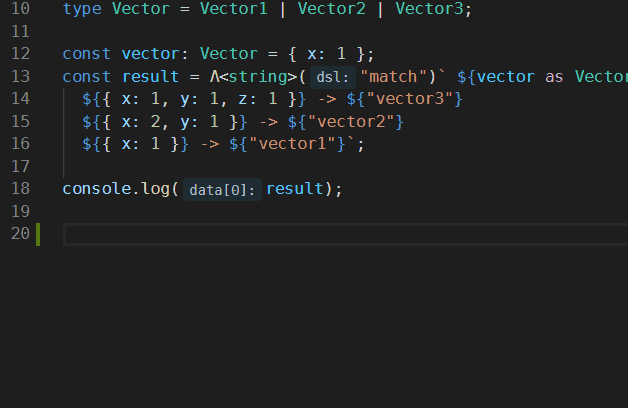draft-dsl-match v0.2.0
DSL Match · 

DSL Match is used in typedraft to support pattern match.
Inspirations
This DSL is inspired by ts-pattern and tc39/proposal-pattern-matching. Examples and test cases are adapted from ts-pattern.
Installation
Suppose that you have typedraft installed, then:
npm i -D draft-dsl-matchand add it to typedraft.config.ts:
import { PatternMatch } from "draft-dsl-match";
export default {
DSLs: [{ name: "match", dsl: () => new PatternMatch() }],
};You can use dsl-match-demo as template project to get started quickly.
Examples
Data Structure
Support objects, arrays, tuples, Sets, Maps, and all primitive types.
Object
import { MatchDSL } from "draft-dsl-match";
type Vector1 = { x: number };
type Vector2 = { x: number; y: number };
type Vector3 = {
x: number;
y: number;
z: number;
};
type Vector = Vector1 | Vector2 | Vector3;
const vector: Vector = { x: 1 };
const result = Λ<string>("match")` ${vector as Vector}
${{ x: 1, y: 1, z: 1 }} -> ${"vector3"}
${{ x: 2, y: 1 }} -> ${"vector2"}
${{ x: 1 }} -> ${"vector1"}
`;
console.log(result); // "vector1"In this example, import { MatchDSL } from "draft-dsl-match" is necessary even MatchDSL is not used because Λ will be translated to MatchDSL.
Λ is unicode U+039B, it resembles caret and is used to introduce a new context where you can apply a DSL, and <string> is used to assert the output type.
"match" is the name of the DSL. You can customize it in typedraft.config.ts.
The syntax is straightforward, you put whatever you want to match in the first ${}, and the ${} at the left of -> is pattern you want to match, the ${} at the right is handler, putting values here implies () => { return <values>; }
It's hard to type Λ, thus we recommend that you can create code snippet in vscode so that you can type it in this way:

The snippet you may want to reuse:
{
"dsl": {
"scope": "javascript,typescript,typescriptreact",
"prefix": "dsl",
"body": ["Λ('$1')` $2`"],
"description": "use dsl in typedraft"
}
}Array
import { MatchDSL, String, __ } from "draft-dsl-match";
type Input = { title: string; content: string }[];
let input: Input = [
{ title: "Hello world!", content: "I‘m a very interesting content" },
{ title: "Bonjour!", content: "I‘m a very interesting content too" },
];
const result = Λ("match")` ${input}
${[{ title: String, content: String }]} -> ${"a list of posts!"}
${__} -> ${"something else"}
`;
console.log(result); // "a list of posts!"__ will match any value, and String is used to denote the String type.
Tuple
import { MatchDSL, Number } from "draft-dsl-match";
const sum = (args: number[]): number => Λ<number>("match")` ${args}
${[]} -> ${0}
${[Number, Number]} -> ${([x, y]) => x + y}
${[Number, Number, Number]} -> ${([x, y, z]) => x + y + z}
${[Number, Number, Number, Number]} -> ${([x, y, z, w]) => x + y + z + w}
`;
const result = sum([2, 3, 2, 4]);
console.log(result); // 11Then we can have function overloading in this way:
import { MatchDSL, Number, String, __ } from "draft-dsl-match";
type ArgsType = [string, string] | [number, number] | [any, any];
type RetrunType = number | string | any;
const add = (args: ArgsType): RetrunType => Λ<RetrunType>("match")` ${args as ArgsType}
${[String, String]} -> ${args => args.join(" ")}
${[Number, Number]} -> ${([x, y]) => x + y}
${[__, __]} -> ${args => `the sum is args.join("-"): ${args.join("-")}`}
`;
console.log(add(["hello", "world"]));
console.log(add([1, 2]));
console.log(add(["hi", 1]));
// hello world
// 3
// the sum is args.join("-"): hi-1Sets and Maps
import { MatchDSL, __ } from "draft-dsl-match";
const ContainsGabAndYo = (set: Set<string | number>) => Λ<[boolean, boolean]>("match")` ${set}
${new Set(["gab", "yo"])} -> ${[true, true]}
${new Set(["gab"])} -> ${[true, false]}
${new Set(["yo"])} -> ${[false, true]}
${__} -> ${[false, false]}
`;
console.log(ContainsGabAndYo(new Set(["gab", "yo", "hello"])));
console.log(ContainsGabAndYo(new Set(["gab", "hello"])));
console.log(ContainsGabAndYo(new Set(["yo", "hello"])));
console.log(ContainsGabAndYo(new Set(["hello"])));
console.log(ContainsGabAndYo(new Set([])));
console.log(ContainsGabAndYo(new Set([2])));
// [ true, true ]
// [ true, false ]
// [ false, true ]
// [ false, false ]
// [ false, false ]
// [ false, false ]import { MatchDSL, String, __ } from "draft-dsl-match";
const users_map = new Map([
["gab", { name: "gabriel" }],
["angégé", { name: "angéline" }],
]);
const user_pattern = { name: String };
const result = Λ("match")` ${users_map as Map<string, { name: string }>}
${new Map([
["angégé", user_pattern],
["gab", user_pattern],
])} -> ${map => ({ name: map.get("angégé")!.name + " " + map.get("gab")!.name })}
${new Map([["angégé", user_pattern]])} -> ${map => map.get("angégé")}
${new Map([["gab", user_pattern]])} -> ${map => map.get("gab")}
${__} -> ${{ name: "unknown" }}
`;
console.log(result); // { name: 'angéline gabriel' }Predicate
Predicate can also be used at the left side of ->:
import { MatchDSL, __ } from "draft-dsl-match";
const values = [
{ value: 1, expected: false },
{ value: -2, expected: false },
{ value: 3, expected: false },
{ value: 100, expected: false },
{ value: 20, expected: true },
{ value: 39, expected: true },
];
values.forEach(({ value, expected }) => {
const result = Λ<boolean>("match")` ${value}
${(x: number) => x > 10 && x < 50} -> ${true}
${__} -> ${false}
`;
console.log(result === expected);
});
// true
// true
// true
// true
// true
// trueProperties selection
You can use matched value in this way:
import { MatchDSL, __, use } from "draft-dsl-match";
const y = Λ("match")` ${["get", 2]}
${["get", use("y")]} -> ${(_, { y }) => y}
`;
console.log(y); // 2The second param of handler is an object that contains values you want to "use".
License
DSL Match is MIT licensed.
5 years ago
5 years ago
5 years ago
5 years ago
5 years ago
5 years ago
5 years ago
5 years ago
5 years ago
5 years ago
5 years ago
6 years ago
6 years ago
6 years ago
6 years ago
6 years ago